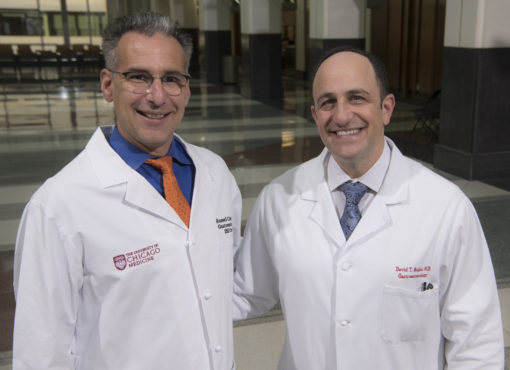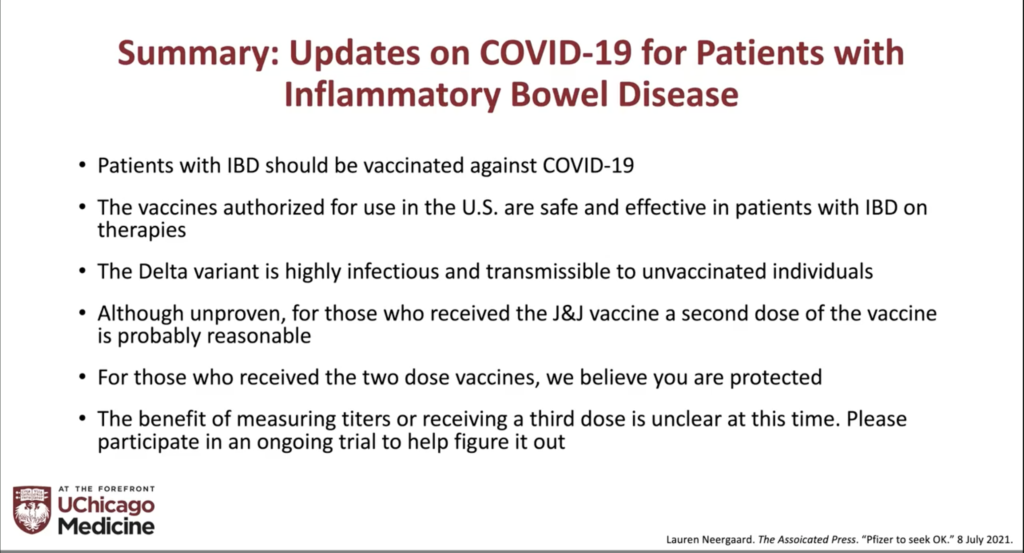On Wednesday, July 21, more than 270 participants joined David T. Rubin, MD, and Russell D. Cohen, MD for an online educational event for IBD patients and their families. The event highlighted the new wave of treatments for Crohn’s disease and ulcerative colitis, and provided information about COVID-19 and vaccination as they relate to inflammatory bowel diseases. You can view videos of Dr. Rubin’s and Dr. Cohen’s presentations on the UChicago Medicine IBD Center website.
Several new treatments for Crohn’s disease and ulcerative colitis have emerged in the past year, including an S1P modulator just approved in May 2021 for ulcerative colitis. Dr. Cohen explained the multiple mechanisms of action for all the biologic IBD medications currently on the market, the risks and benefits for each, and how UChicago Medicine IBD physicians best personalize approaches for each patient.
As Dr. Cohen explained, “For many years, we had just a few treatments, which we had to give to everyone. But what are hoping to do, with the help of research, is identify the predominant inflammatory pathway for each patient, and then choose the best agent, customized for that patient, and then verify that it is working. It’s very exciting.”
As the SARS-CoV2 pandemic continues to evolve, Dr. Rubin reviewed the international consensus on COVID-19, vaccines and IBD, as well as his personal recommendations for patients. Dr. Rubin first explained concerns about the Delta variant, which is now responsible for the vast majority of new infections in the United States.
“How dangerous is the delta variant?” said Dr. Rubin, “It is a much more contagious variant of the SARS-CoV-2 virus. But I want to emphasize: the current vaccines protect you from the Delta variant… They target the spike protein of the SARS-CoV2 virus, and all the available vaccines produce antibodies for this variant. It is patients who are unvaccinated who are at the highest risk of getting infected with Delta.”
Further, Dr. Rubin emphasized, “We urge all our patients to get vaccinated for COVID-19. Patients with IBD are not at an increased risk for COVID compared to the general population, and IBD medications do not contribute to greater risk for IBD patients.”
Dr. Rubin also addressed media reports from Spring 2021 about COVID-19 and IBD, which seemed to indicate that COVID-19 vaccines were not as effective for patients on certain medications such as infliximab (Remicade) and adalimumab (Humira). Dr. Rubin explained that these media reports were inaccurate, and based on studies of organ transplant patients, not comparable to an average population of IBD patients.
“We have good data and international consensus that patients who are on these medications have a normal response to these vaccines, and are protected,” explained Dr. Rubin.
This program was made possible thanks to the support of the GI Research Foundation and underwritten by an unrestricted educational grant from AbbVie. The UChicago IBD Center holds several educational programs for patients and their families throughout the year. To receive information about programs from the University of Chicago IBD Center, please email ibdcenter@uchicago.edu.


